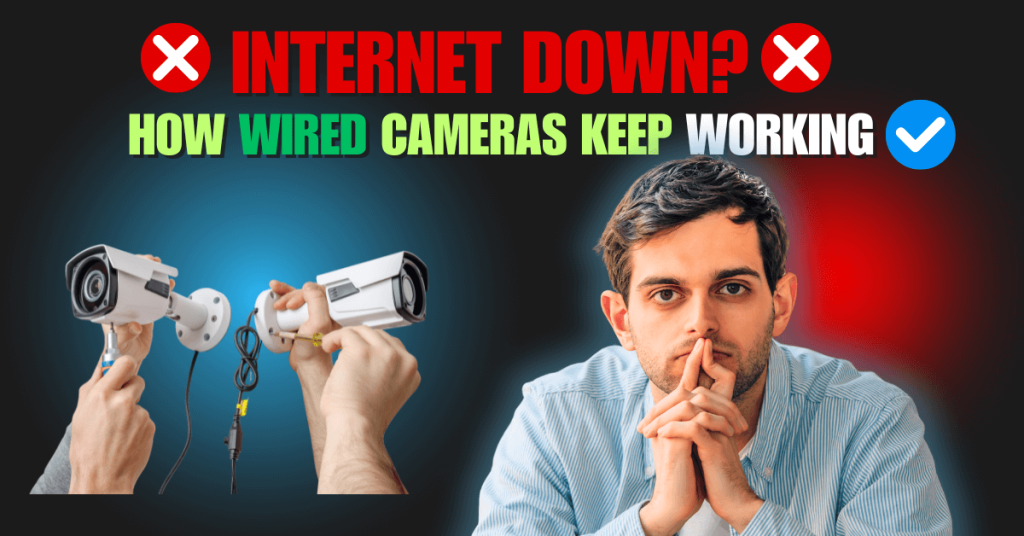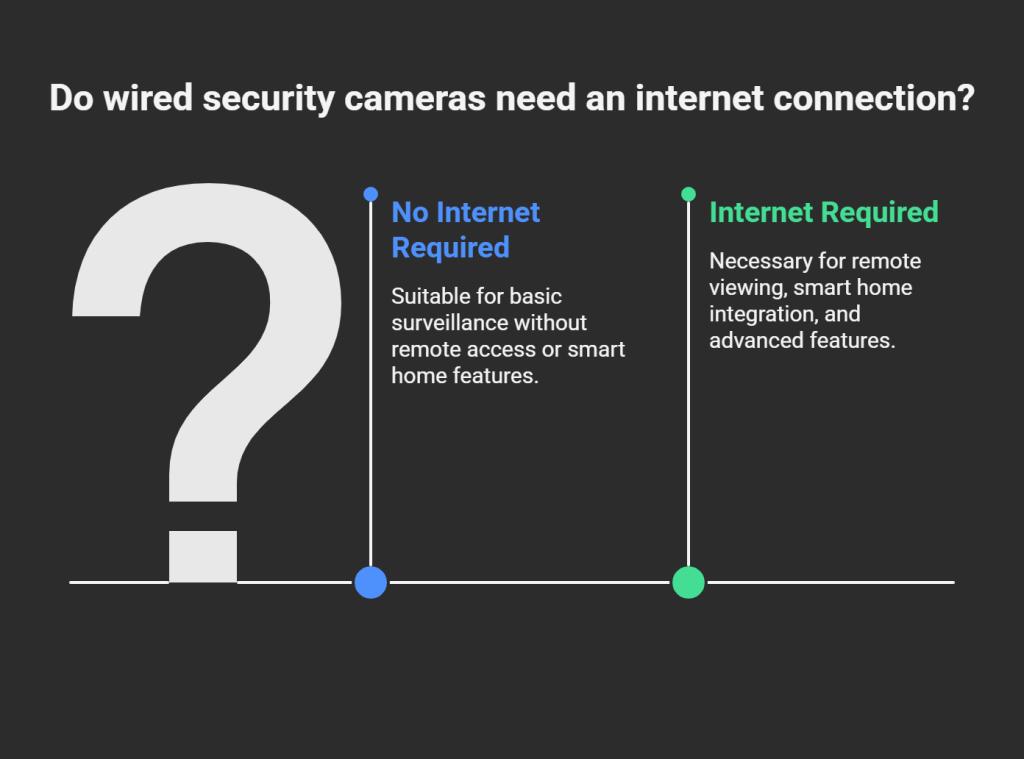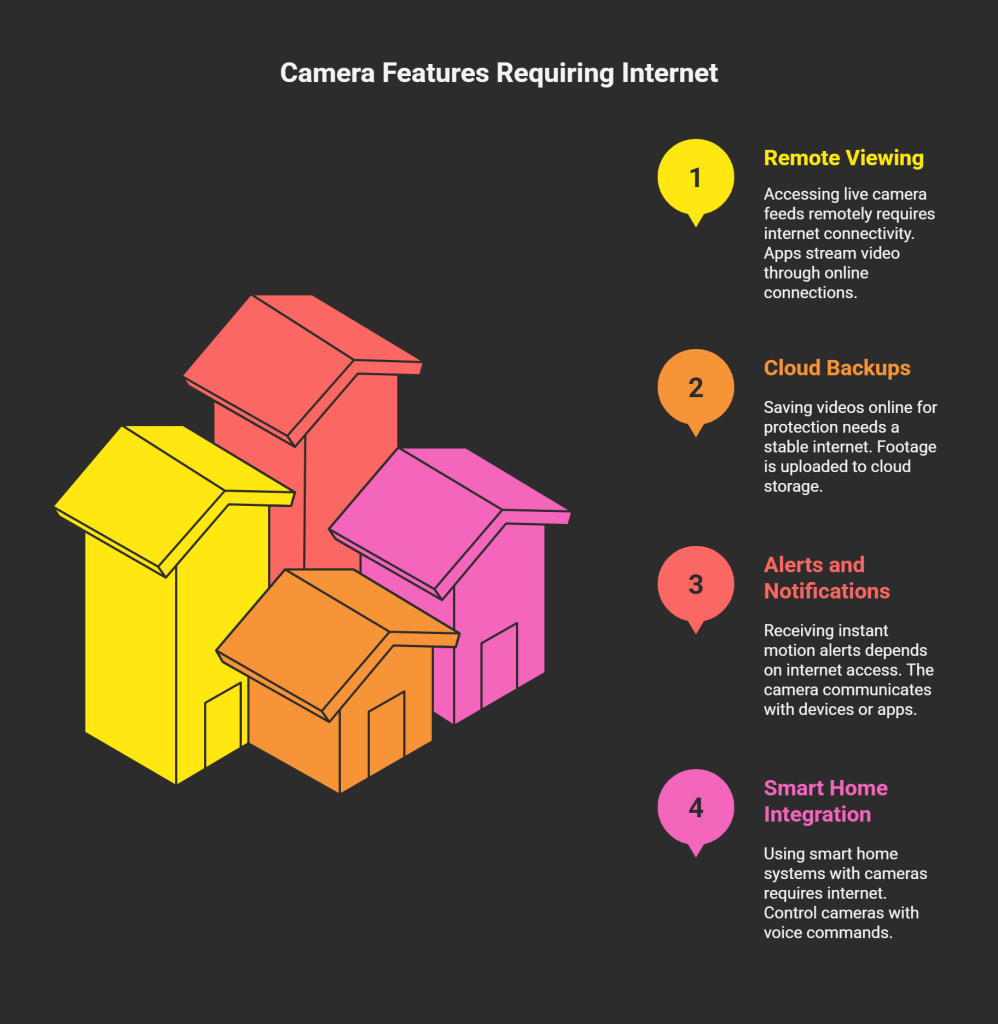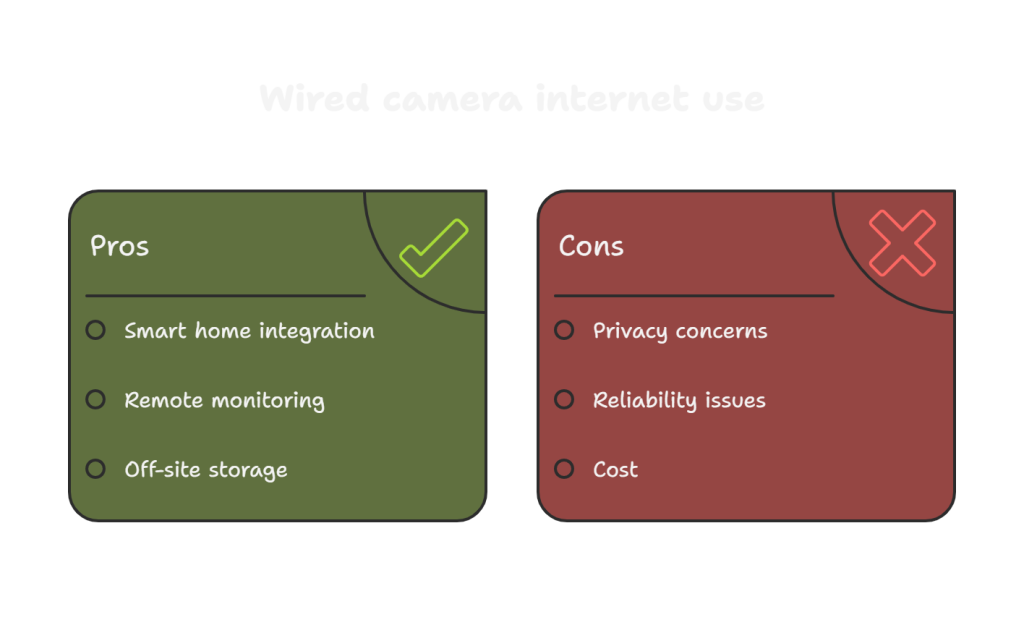The short answer is no—wired security cameras can function without an internet connection. These cameras typically record footage directly to a local storage device, such as a DVR, NVR, or SD card, making them ideal for offline surveillance. This means they’ll continue to work even during internet outages, providing reliable, uninterrupted security.
However, internet access expands their capabilities. Without it, you won’t get remote viewing, real-time alerts, or cloud backups—features that require an online connection. If you want to check live feeds from your phone, receive motion detection notifications, or store footage in the cloud, then the internet is necessary.
The choice depends on your needs:No internet? Your cameras will still record locally, keeping your property monitored without remote access.With internet? You gain smart features but introduce potential vulnerabilities like hacking risks.In short, wired cameras don’t require internet to work, but adding it unlocks advanced functionality. Whether you need full offline reliability or the convenience of remote access depends on your security priorities.Everyone Switching Back To Wired Cameras

No, wired security cameras don’t need internet for basic recording. They save footage directly to a local DVR/NVR, keeping your property protected 24/7—even during internet outages. You only lose remote features (like phone alerts) without WiFi.
Key Points:
✓ Works offline: Records locally without internet
✓ Power-only: Needs electricity (PoE or cable)
✓ No hacking risk: Offline = more secure
✗ No remote access: Viewing live feeds requires internet
Use wired cameras as your “blackout-proof” security backbone. Add internet only if you need phone alerts or cloud backups.
Do Wired Security Cameras Always Need Internet?

Wondering if your wired security cameras need an internet connection to keep your home or business safe? It’s a question many people ask when setting up a security system. The answer isn’t a simple yes or no—it depends on the type of camera and how you want to use it. Some wired cameras work perfectly fine without internet, while others rely on it for extra features like remote viewing or smart home integration. In this guide, we’ll break it down in simple terms to help you understand when wired security cameras need internet and when they don’t, so you can choose the best setup for your needs.
When Wired Security Cameras Don’t Need Internet
Wired security cameras can often work without an internet connection, especially if you’re focused on basic surveillance and local recording.About DVR Vs NVR For Security, Here’s when you can skip the internet:
- Pure Analog or DVR Systems: Traditional wired cameras, like CCTV systems, connect directly to a digital video recorder (DVR) using cables (e.g., coaxial). These setups record footage locally to the DVR’s hard drive and don’t need internet to function. They’re great for simple, reliable monitoring without online dependency.
- Local Recording to SD Cards or NVRs: Many modern wired cameras, such as Power over Ethernet (PoE) models, can save footage to an SD card or a Network Video Recorder (NVR). These systems store video on-site, so no internet is required for recording or playback. For example, a PoE camera connected to an NVR can record 24/7 without ever touching the internet,Top Amazon Reviews NVRs.
When Wired Security Cameras Need Internet

While some wired cameras work offline, certain features require an internet connection to unlock their full potential. Here’s when internet is necessary:
- Remote Viewing: If you want to check your camera’s live feed from your phone or computer using apps like Reolink, Hikvision, or Arlo, you’ll need internet. These apps rely on an online connection to stream video to you, whether you’re at work or on vacation.
- Cloud Backups: Some wired cameras offer cloud storage for your footage. This means your videos are saved online, protecting them from theft or damage to your local storage. Cloud backups require a stable internet connection to upload footage.
- Alerts and Notifications: Want your camera to send instant alerts to your phone when it detects motion? This feature depends on internet to communicate with your device or app.
- Smart Home Integration: If you use smart home systems like Alexa, Google Home, or IFTTT with your cameras, internet is a must. These integrations allow you to control your cameras with voice commands or link them to other smart devices, but they rely on an online connection.
Deciding whether your wired security cameras need internet depends on your goals. If you just want a reliable, local recording without extra bells and whistles, an analog or NVR-based system can work offline. But if you love the idea of checking your cameras from anywhere or getting instant alerts, you’ll need internet for those advanced features. Many cameras, like those from Reolink or Hikvision, offer flexibility—you can use them offline for basic recording or connect them to the internet for remote access. Check your camera’s manual or specs to confirm its capabilities, and consider your internet reliability if you’re in an area with spotty connectivity.
By understanding these options, you can pick a wired security camera system that fits your needs, whether you want to keep things simple or go all-in with smart features. If you’re still unsure which system is right for you, let us know your setup, and we can help you decide!Can Wired Security Cameras Be Jammed?
When Would You Need Internet for Wired Security Cameras?
Wired security cameras don’t always need internet to function, but certain features and use cases make an internet connection essential. If you’re looking to integrate your cameras with smart home systems, monitor a business remotely, or store footage off-site, internet is a must. Below, we’ll explain these use cases in simple terms to help you understand when and why wired cameras need internet.

Use Cases Requiring Internet
Here’s when you’ll need an internet connection for your wired security cameras:
- Smart Home Integration: If you want your wired cameras to work with smart home systems like Alexa, Google Home, or IFTTT, internet is required. These platforms rely on online connectivity to let you control cameras with voice commands, view feeds on smart displays, or link cameras with other devices (e.g., turning on lights when motion is detected). For example, a wired camera like the Reolink PoE can integrate with Google Home, but only with an active internet connection.
- Business Monitoring: For businesses, especially those with multiple locations or owners who aren’t always on-site, internet enables remote monitoring. You can check live feeds or recorded footage from anywhere using apps like Hikvision’s Hik-Connect or Reolink’s mobile app. This is crucial for keeping an eye on employees, customers, or property in real-time, whether you’re across town or across the country.
- Off-Site Backups: Storing footage in the cloud ensures your videos are safe from theft, damage, or local storage failure. Cloud backups, offered by brands like Arlo or some Reolink models, require internet to upload footage to secure online servers. This is ideal if you want access to recordings from anywhere or need extra security for critical footage.
Why Internet Matters for These Use Cases
These features—smart home integration, remote business monitoring, and off-site backups—rely on internet to transmit data, whether it’s streaming live video, sending motion alerts, or uploading files to the cloud. Without internet, wired cameras can still record locally (e.g., to an NVR, DVR, or SD card) but lose the ability to connect remotely or integrate with online systems. For example, a PoE camera can save footage to an NVR without internet, but you’d need to be on-site to view it unless connected online.
Do You Need Internet?
If your goal is basic local recording, your wired cameras can work without internet using a DVR or NVR. But for smart home features, remote access, or cloud storage, a reliable internet connection is essential. Check your camera’s specs (e.g., Reolink or Hikvision models) to confirm which features require internet, and ensure your internet is stable if you rely on these use cases. If you’re unsure about your setup or need help choosing the right system, let us know!
How to Set Up Wired Cameras Without Internet?
If you want a security camera system that works without internet—whether for privacy, remote locations, or just to keep things simple—wired cameras are a great choice. Unlike Wi-Fi cameras, they don’t rely on a network connection, so you’ll still get reliable surveillance even if your internet goes down.
Let’s break down the setup process into simple steps.
FAQs About Wired Security Cameras and Internet Requirements
To help your readers better understand whether wired security cameras need internet, here are some frequently asked questions (FAQs) with clear, concise answers. These address common concerns and provide practical insights for setting up and using wired security cameras.
Do wired security cameras need internet to work?
No, wired security cameras don’t always need internet. Systems like analog CCTV with a DVR or PoE cameras with an NVR can record locally to a hard drive or SD card and work without internet. However, internet is required for features like remote viewing, cloud storage, or smart home integration.
Can I view my wired cameras without internet?
Yes, you can view live footage by connecting your cameras to an NVR or DVR and attaching a monitor via HDMI or VGA. This setup displays the feed locally without needing internet, but you won’t be able to access it remotely from a phone or computer.
3. What happens to my wired cameras if the internet goes out?
If your cameras are set up for local recording (e.g., to an NVR, DVR, or SD card), they’ll continue to record and function normally during an internet outage. However, you’ll lose access to remote viewing, cloud backups, or notifications until the internet is restored.
4. Do all wired cameras support local storage?
Not all wired cameras support local storage. Most PoE cameras work with NVRs or have SD card slots for local recording, and analog cameras pair with DVRs. Check your camera’s specifications (e.g., Reolink or Hikvision models) to confirm local storage options.
5. Can I use wired cameras with smart home devices without internet?
No, smart home integration with devices like Alexa or Google Home requires an internet connection. Without internet, your wired cameras can still record locally but won’t communicate with smart home systems.
6. Is it safe to run wired cameras without internet?
Yes, running wired cameras without internet can be safer since there’s no risk of online hacking. Your footage stays on local storage (e.g., NVR or DVR), but ensure the physical device is secure to prevent tampering or theft.
7. How do I set up wired cameras without internet?
Connect your cameras to an NVR or DVR using Ethernet (for PoE) or coaxial cables (for analog). Attach a monitor to the NVR/DVR for live viewing. Configure local storage (hard drive or SD card) and set up motion detection through the system’s menu for efficient recording.
8. Can I add internet to my wired cameras later?
Yes, most modern wired cameras (e.g., Reolink or Hikvision) support both offline and online modes. You can start with local recording and later connect the system to internet for remote access or cloud storage, as long as your NVR/DVR and cameras support these features.
